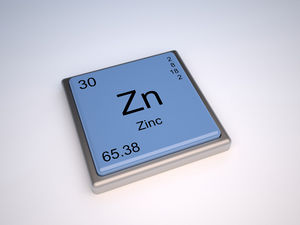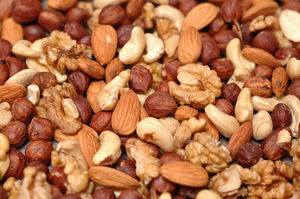Zinc
| See Also | Minerals |
|---|
Zinc is an essential mineral involved in more biochemical reactions in the body than any other mineral. It is also important for proper action of many hormones including thymic hormone, insulin, growth hormone, and sex hormone. The tissues highest in zinc are the muscles and red and white blood cells. Other tissues high in zinc are bone, skin, kidney, liver, pancreas, retina, and prostate [1].
Zinc and copper are often thought of together because they are present in an inverse manner in the serum and copper tends to accumulate in the blood when zinc is deficient [2].
Contents
Food Sources
The following foods have the highest concentration of zinc. For a more expansive list on food sources of specific nutrients visit Health Canada's Dietary Reference Intakes for Elements or USDA's National Nutrient Database
Other food sources include:[3]
Plant sources of zinc are not as bioavailable because they bind to phytic acid (a fiber compound) and are not absorbed.
Uses
The following is a list of the primary uses for zinc. [2] [1] *Zinc deficiency: Zinc deficiency can be caused by decreased intake or an abnormality in utilization of the mineral.
- Some health conditions associated with decreased intake are: anorexia nervosa, fad diets, protein deficiency, vegetarianism, alcoholic cirrhosis, old age, acute infection/inflammation, alcoholism, increased body loss (starvation, burns, post trauma).
- Some health conditions associated with decreased absorption: diabetes mellitus, high-fiber diet, high dietary calcium:zinc ratio, high dietary iron:zinc ratio, alcoholism, chelating agents, acrodermatitis enteropathica, dialysis, achlorhydria/hypochlorhydria, hepatic disease, celiac disease, inflammatory bowel disease, diarrhea, intestinal resection, chronic blood loss, short bowel syndrome, pancreatic insufficiency.
- Zinc supplementation and pregnancy outcome: Zinc plays an important role in fetal development as it is crucial for proper cell division. Low zinc levels are associated with premature birth, low birth weight, delays in growth, and pre-eclampsia. Studies have shown that a dosage larger than the RDA for pregnancy are beneficial during pregnancy and improve outcomes.
- Immune function and the common cold: Zinc is required in many immune functions and when levels are low T cell count decreases, thymic hormone levels decrease, and white blood cells stop functioning as they should. Zinc supplementation appears to be beneficial for decreased immune function associated with aging. Zinc has antiviral activity including against those viruses known to cause the common cold.
- Male Sexual Function: Zinc is important for hormone metabolism, sperm formation, and sperm motility. Low zinc may even contribute to infertility because it decreases testosterone levels and sperm count.
- Rheumatoid Arthritis: Zinc is often found to be low in individuals with rheumatoid arthritis. Studies using zinc sulfate have shown some benefit; however, it may be more beneficial to use more absorbable forms such as zinc picolinate, zinc acetate, zinc monomethionine or zinc citrate.
- Acne: Studies using zinc citrate and zinc gluconate have shown beneficial effects for the treatment of acne. Zinc sulfate, being less absorbable, does not show the same beneficial results.
- Macular Degeneration: A study has shown that patients with macular degeneration receiving zinc supplementation experienced less vision loss than those receiving placebo.
- Alzheimer's Disease: It is possible that zinc deficiency is a major contributing factor to the development of Alzheimer's Disease. Important DNA replication, repair, and transcription enzymes contain zinc; one cause of dementia has been linked to improper DNA handling in nerve cells due zinc deficiency. Furthermore, many zinc is also an important antioxidant crucial to the functioning of superoxide dismutase. Improper antioxidant activity within the brain my lead to the neurofibrillary tangle and plaques found in the brains of those with Alzheimer's. The use of zinc aspartate has shown positive results in treating Alzheimer's Disease.
- Wilson's Disease: Wilson's disease is caused copper accumulation in the liver which eventually makes its way to other parts of the body and leads to severe brain damage. Zinc interferes with copper absorption and thus is seen as a viable treatment for this disease.
- Eating Disorders: Research since 1934 has shown a link between zinc deficiency and eating disorders such as obesity, pica, anorexia nervosa, and bulimia nervosa.
- Epidermolysis Bullosa: This is an inherited zinc deficiency disease. Signs and symptoms include severe chronic diarrhea, muscle wasting,alopecia, and rough, thick, ulcerated skin around the body's orifices and extremities. Zinc supplementation along with other nutrient supplementation appears to show some improvement in symptoms.
- Hypothyroidism: Zinc helps the binding of an important thyroid hormone, T4, which is involved in proper metabolism and supplementation may be helpful for those with hypothyroidism.
- Attention Deficit Hyperactivity Disorder (ADHD): Zinc helps the body and brain use essential fatty acids. One study done in 1996 showed that serum zinc levels were low in children with ADHD and essential fatty acid levels were also low; which one was contributing to the ADHD symptoms was not clear. A more recent study shows that taking a zinc supplement with Ritalin shows improvement. These studies show the importance of zinc for proper utilization of essential fatty acids by the body, especially the brain in individuals with ADHD and may even enhance the therapeutic effect of mainstream medications used in treatment.
Deficiency Symptoms
Zinc deficiency is becoming more common and has a number of causes including: zinc is being leached out of soil; cropping has also removed much of it from the soil; it is removed in the processing of grains, it is dissolved in cooking water; and is removed by chelating agents such as EDTA which is used as a preservative in many foods. Symptoms that arise may include:
- stria and stretch marks in men and women
- retarded growth of skin appendages
- white areas in nails
- dandruff and hair loss
- acne
- deficiency interferes with the menstrual cycle
- slows wound healing
- frequent and/or severe infections
- increases blood pressure
- joint pain
- loss of taste and smell (and reduced appetite)
- psychiatric symptoms
- sleep and behavioural disturbances
- acrodermatitis enteropathica (includes dermatitis, alopecia, and diarrhea)
Excess Symptoms
Zinc administration, especially without compensatory copper can produce rapid adverse effects. Prolonged use at a dose of 150mg daily or an acute dose of 200mg daily may lead to toxicity signs and symptoms such as:
- diarrhea
- vomiting
- metallic taste in the mouth
- dizziness
- drowsiness
- incoordination
- lethargy
- copper deficiency anemia
- depressed immune function
- reduced high-density lipoprotein (HDL) cholesterol levels
Acute zinc toxicity is extremely rare because high doses usually induce vomiting before toxic levels can be reached.
Lack of smell has been associated with zinc nasal sprays.
Assessment Procedure
Best specimens to collect:[4]
- RBC Zinc - a low level indicates a deficiency
- Hair Mineral Analysis - a low level indicates a deficiency
- Plasma Zinc - a high level indicates a deficiency
- LA to DGLA ratio
Prescribing Considerations
- Zinc bound to picolinate, acetate, citrate, glycerate, or monomethionine are excellent forms of zinc and are well absorbed [1]. It is not recommended to take more than 150mg daily for greater than one week as high doses can actually impair the immune system.
- The recommended dosages varies based on age and health status. To determine what your specific requirements are talk to your naturopathic doctor or other trained medical professional.
- Infant (under 1 year): 5mg
- Child (1-10 years): 10mg
- Adolescent - Adult (11+ years): 15mg (Males); 12mg (Females)
- Pregnancy: 15mg
- Lactation: 19mg
Safety
- Adults: Ingestion of 10-30g of zinc sulfate can be lethal.
- Pregnancy and Breastfeeding: Adequate maternal zinc intake is essential during the growth and development of the fetus. However, excess zinc during embryogeneis (the first 8 weeks of development) can be teratogenic and lethal. 100mg taken three times daily in the third trimester has resulted in premature births and stillbirths. Zinc and copper must also be taken in balance during breastfeeding to prevent zinc-induced copper deficiency. Typical doses have not shown any adverse effects on fetal development or in breastfed infants.
- Contraindications: None have been reported.
- Precautions: Warning against extended use of zinc without copper. The recommended ratio of zinc:copper is 15:1 - 20:1.
Drug Interactions
- Drug Interactions include:[5]
- Supportive or Beneficial:
- Amphetamines and Related Stimulant Medications - Zinc may benefit those with ADHD and also increase the therapeutic activity of these drugs.
- Androgens - Deficiency in zinc can lead to hypogonadism, and administration can elevate testosterone levels, raise sperm counts, and enhance action of androgen therapy especially when pre-treatment levels of zinc are low.
- Antibiotics, topical - Zinc is bacteriostatic against Propionibacterium acnes and is beneficial in treating inflammatory acne. Co-administration may enhance antibiotic treatment of acne vulgaris.
- Antidepressants, Including Tricyclic Antidepressants, and Selective Serotonin Reuptake Inhibitors (SSRIs) Antidepressants - Zinc deficiency may contribute to depression and supplementation may potentiate the activity of antidepressant medications.
- Chlorhexidine - Co-administration of zinc can enhance binding affinity, reduce severity of chlorhexidine-induced staining, and enhance plaque-inhibiting effects.
- Clobetasol and Related Corticosteroids, topical - Co-administration of zinc and biotin along with drug may enhance therapeutic effect in treatment of inflammatory dermatological conditions.
- Metronidazole (vaginal) - Co-administration may show a greater therapeutic effect on trichomoniasis than either agent alone.
- Penicillamine - This drug is used as a chelating agent to treat copper, iron, and other metal overload and intoxication. Zinc helps to reduce copper levels. Separate intake.
- Radiotherapy: Prophylactic or concomitant zinc administration may reduce loss of taste associated with radiation therapy to the head and neck and help to speed up recovery.
- Addresses Drug-Induced Deficiency:
- Captopril, Enalapril, and Related Angiotensin-Converting Enzyme (ACE) Inhibitors - ACE inhibitors bind zinc and deplete the mineral at the tissue level, possibly leading to deficiency. The effects of captopril are faster than the effects of enalapril.
- Corticosteroids, oral, Including Prednisone - Internal or exogenous glucocorticoids can affect zinc metabolism. Co-administration can prevent and reverse depletion. Complement with low dose copper for long-term use.
- Histamine (H2) Receptor Antagonists and Related Antacids and Gastric Acid-Suppressive Medications - Agents that interfere with normal acid environment of the stomach can impair zinc absorption and reduce availability. Separate intake by at least 2 hours.
- Loop Diuretics - Drug can increase urinary zinc excretion.
- Nonsteroidal Anti-inflammatory Drugs (NSAIDs) - NSAIDs and other anti-inflammatory medications may induce zinc depletion. Concomitant intake may enhance therapeutic effect. Separate intake by at least 2 hours.
- Thiazide Diuretics - Drug can increase urinary zinc excretion. Concomitant zinc may be appropriate.
- Valproic Acid and Related Anticonvulsant Medications - Risk of decreased zinc levels is greater with valproic acid alone or in combination with other anticonvulsant medications.
- Zidovudine (AZT) and Related Nucleoside or Non-nucleoside (Analog) Reverse-Transcriptase Inhibitors (NRTIs or NNRTIs) Antiretroviral Agents - Zinc is central to immune function but AZT depletes zinc. Furthermore, zinc deficiency may diminish drug's effectiveness. In addition, the HIV population tends to be low in zinc. Zinc co-administration appears to provide protective benefits, particularly in patients with diarrhea and opportunistic infections caused by Pneumocystis carinii and Candida.
- Separate Intake:
- Ciprofloxacin and Related Fluoroquinolone (4-Quinolone) Antibiotics - Decreased therapeutic action of drug when taken simultaneously. Separate intake by several hours or avoid during drug treatment.
- Warfarin and Related Oral Vitamin K Antagonist Anticoagulants - Binding may occur with simultaneous intake and inhibit absorption and bioavailability of both agents. Minimal effect with separate intake.
- Other:
- Antibiotics, oral - Concomitant use may benefit some patients, especially those with compromised zinc status, but may be contraindicated in treatment of pneumonia in hot weather.
- Estrogens (conjugated), Oral Contraceptives, Medroxyprogesterone, & Estrogen Replacement Therapy - Oral contraceptives may deplete zinc. Conjugated estrogens and medroxyprogesterone may reduce previously elevated urinary zinc excretion in osteoporotic postmenopausal women. Estrogen replacement therapy may enhance zinc status.
- Potassium-Sparing Diuretics - Different potassium-sparing diuretics affect zinc in various ways. Amiloride may cause zinc accumulation; triamterene may increase urinary zinc excretion. Consider concomitant zinc use. Separate by two hours. Complement with low-dose copper with long-term use.
- Tetracycline Antibiotics - Chelation occurs between zinc and tetracycline-class antibiotics (other than doxycycline). Discontinue zinc (including zinc-rich foods), or separate intake during short-term therapy. Consider doxycycline. Zinc supplementation may be appropriate during long term drug treatment but caution is warranted. Separate intake.
Nutrient Interactions
- Nutrient Interactions include: [5]
- Antioxidant Nutrients - Research has shown a benefit in the treatment of macular degeneration using zinc and other antioxidants such as lutein and anthrocyanoside-rich plants such as bilberry.
- Calcium and calcium based Antacids - Calcium at high doses (1500mg) may impair zinc absorption particularly in the fasting state. The presence of food or separate intake does not show this same impairment.
- Copper - Excess zinc intake can impair copper absorption.
- L-Cysteine - Zinc absorption may be enhanced with concomitant intake of L-cysteine.
- Glutamine and Probiotic Bacterial Flora - Glutamine and probiotic bacterial flora are common treatments for "leaky gut syndrome" or increased intestinal permeability seen in many GI conditions. Zinc administration in this population has shown to resolve permeability alterations in patients with Crohn's disease in remission.
- L-Histidine - can increase the absorption of zinc.
- Iron - Iron and zinc may compete for absorption due to similar physiochemical properties and potentially shared absorptive pathways. This may reduce the bioavailability and action of each agent during simultaneous intake.
- Magnesium - Zinc may exert inhibitory effects on magnesium balance and absorption. Separate intake by 2 hours.
- Manganese - There is potential for decreased bioavailability of either agent when taking manganese and zinc simultaneously. Separate intake by 2 hours generally mitigates this.
- N-Acetylcysteine (NAC) - High dose NAC can complex with zinc, increasing its absorption but also its urinary excretion. Co-administration of zinc (and copper) may be necessary for individuals on long-term NAC therapy.
- Vitamin B2 - Zinc absorption may be impaired by Vitamin B2 deficiency.
References
- ↑ 1.0 1.1 1.2 Murray Michael T (2005) Encyclopedia of Nutritional Supplements, The Essential Guide for Improving Your Health Naturally, Prima Publishing
- ↑ 2.0 2.1 Hoffer Abram, Prousky Jonathan (2006) Naturopathic Nutrition, A Guide to Nutrient-Rich Food & Nutritional Supplements for Optimum Health, CCNM Press
- ↑ Medlineplus [1]
- ↑ Bralley J Alexander and Lord Richard S (2005) Laboratory Evaluations in Molecular Medicine, Nutrients, Toxicants, and Cell Regulators Institute for Advances in Molecular Medince, GA
- ↑ 5.0 5.1 Stargrove Mitchell Bebell, Treasure Jonathan, McKee Dwight L (2008) Herb, Nutrient, and Drug Interactions, Clinical Implications and Therapeutic Strategies. Mosby


